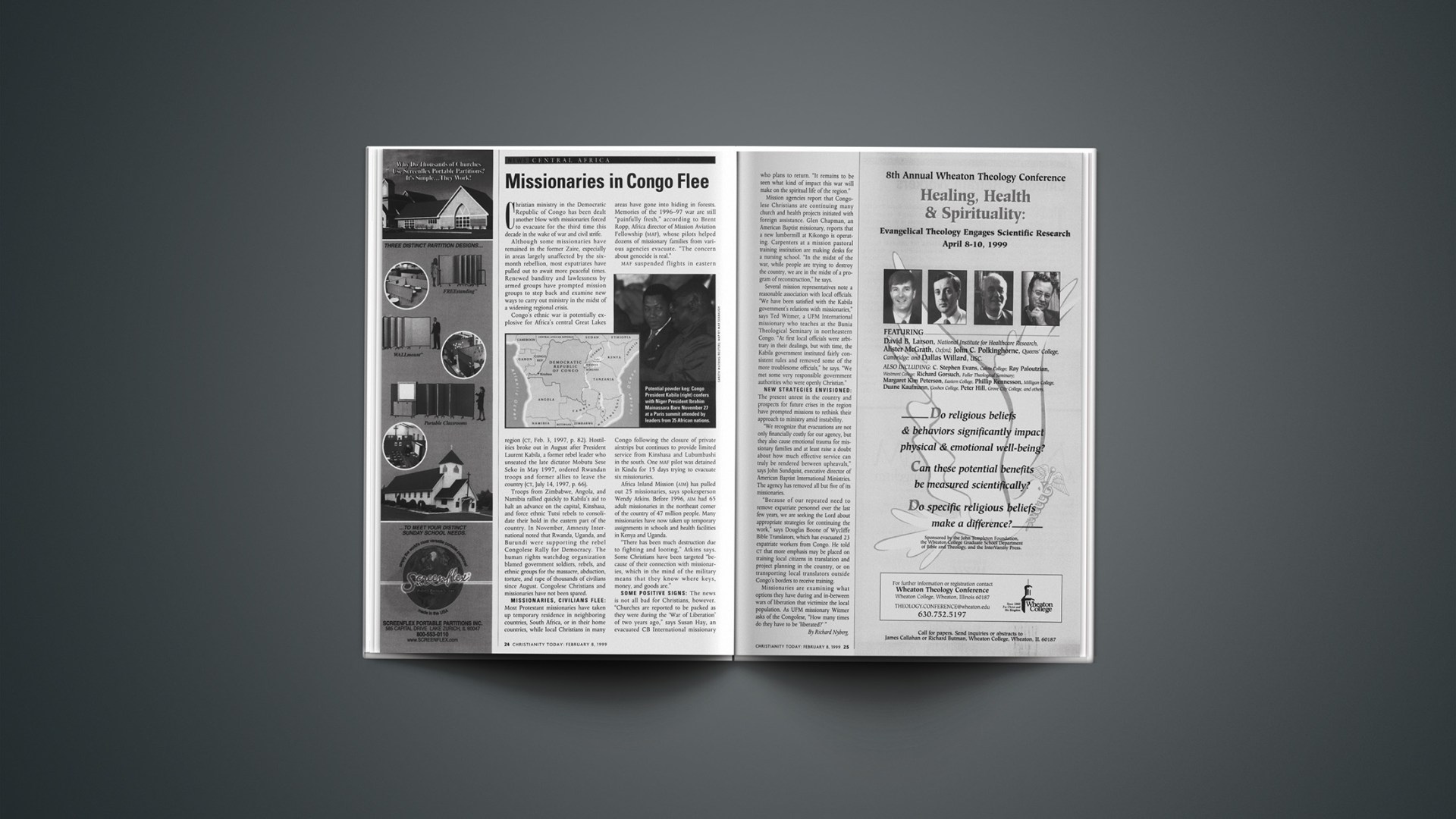Christian ministry in the Democratic Republic of Congo has been dealt another blow with missionaries forced to evacuate for the third time this decade in the wake of war and civil strife.
Although some missionaries have remained in the former Zaire, especially in areas largely unaffected by the six-month rebellion, most expatriates have pulled out to await more peaceful times. Renewed banditry and lawlessness by armed groups have prompted mission groups to step back and examine new ways to carry out ministry in the midst of a widening regional crisis.
Congo’s ethnic war is potentially explosive for Africa’s central Great Lakes region (CT, Feb. 3, 1997, p. 82). Hostilities broke out in August after President Laurent Kabila, a former rebel leader who unseated the late dictator Mobutu Sese Seko in May 1997, ordered Rwandan troops and former allies to leave the country (CT, July 14, 1997, p. 66).
Troops from Zimbabwe, Angola, and Namibia rallied quickly to Kabila’s aid to halt an advance on the capital, Kinshasa, and force ethnic Tutsi rebels to consolidate their hold in the eastern part of the country. In November, Amnesty International noted that Rwanda, Uganda, and Burundi were supporting the rebel Congolese Rally for Democracy. The human rights watchdog organization blamed government soldiers, rebels, and ethnic groups for the massacre, abduction, torture, and rape of thousands of civilians since August. Congolese Christians and missionaries have not been spared.
MISSIONARIES, CIVILIANS FLEE: Most Protestant missionaries have taken up temporary residence in neighboring countries, South Africa, or in their home countries, while local Christians in many areas have gone into hiding in forests. Memories of the 1996-97 war are still “painfully fresh,” according to Brent Ropp, Africa director of Mission Aviation Fellowship (MAF), whose pilots helped dozens of missionary families from various agencies evacuate. “The concern about genocide is real.”
MAF suspended flights in eastern Congo following the closure of private airstrips but continues to provide limited service from Kinshasa and Lubumbashi in the south. One MAF pilot was detained in Kindu for 15 days trying to evacuate six missionaries.
Africa Inland Mission (AIM) has pulled out 25 missionaries, says spokesperson Wendy Atkins. Before 1996, AIM had 65 adult missionaries in the northeast corner of the country of 47 million people. Many missionaries have now taken up temporary assignments in schools and health facilities in Kenya and Uganda.
“There has been much destruction due to fighting and looting,” Atkins says. Some Christians have been targeted “because of their connection with missionaries, which in the mind of the military means that they know where keys, money, and goods are.”
SOME POSITIVE SIGNS: The news is not all bad for Christians, however. “Churches are reported to be packed as they were during the ‘War of Liberation’ of two years ago,” says Susan Hay, an evacuated CB International missionary who plans to return. “It remains to be seen what kind of impact this war will make on the spiritual life of the region.”
Mission agencies report that Congolese Christians are continuing many church and health projects initiated with foreign assistance. Glen Chapman, an American Baptist missionary, reports that a new lumbermill at Kikongo is operating. Carpenters at a mission pastoral training institution are making desks for a nursing school. “In the midst of the war, while people are trying to destroy the country, we are in the midst of a program of reconstruction,” he says.
Several mission representatives note a reasonable association with local officials. “We have been satisfied with the Kabila government’s relations with missionaries,” says Ted Witmer, a UFM International missionary who teaches at the Bunia Theological Seminary in northeastern Congo. “At first local officials were arbitrary in their dealings, but with time, the Kabila government instituted fairly consistent rules and removed some of the more troublesome officials,” he says. “We met some very responsible government authorities who were openly Christian.”
NEW STRATEGIES ENVISIONED: The present unrest in the country and prospects for future crises in the region have prompted missions to rethink their approach to ministry amid instability.
“We recognize that evacuations are not only financially costly for our agency, but they also cause emotional trauma for missionary families and at least raise a doubt about how much effective service can truly be rendered between upheavals,” says John Sundquist, executive director of American Baptist International Ministries. The agency has removed all but five of its missionaries.
“Because of our repeated need to remove expatriate personnel over the last few years, we are seeking the Lord about appropriate strategies for continuing the work,” says Douglas Boone of Wycliffe Bible Translators, which has evacuated 23 expatriate workers from Congo. He told CT that more emphasis may be placed on training local citizens in translation and project planning in the country, or on transporting local translators outside Congo’s borders to receive training.
Missionaries are examining what options they have during and in-between wars of liberation that victimize the local population. As UFM missionary Witmer asks of the Congolese, “How many times do they have to be ‘liberated?’ “
Copyright © 1999 Christianity Today. Click for reprint information.










